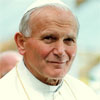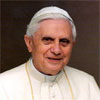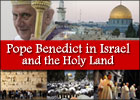"The Holy Land, symbol of God’s love for his people and for the whole of humanity, is also a symbol of the freedom and the peace that God wants for all his children," the Holy Father said. "In fact, however, the history of yesterday and today shows that precisely that Land has become the symbol of the opposite, that is, of divisions and interminable conflicts between brothers."The Pontiff explained that the Holy Land "has been called a 'fifth Gospel,' because here we see, indeed touch, the reality of the history that God realized together with men -- beginning with the places of Abraham’s life to the places of Jesus’ life, from the incarnation to the empty tomb, sign of his resurrection."
"Yes, God came to this land, he acted with us in this world," he continued. "But here we can say still more: The Holy Land, because of its very history, can be considered a microcosm that recapitulates in itself God’s arduous journey with humanity.
"A journey that implicates even the cross with sin, but -- with the abundance of divine love -- the joy of the Holy Spirit too, the resurrection already begun, and it is the journey, through the valley of our suffering, to the Kingdom of God, the kingdom that is not of this world, but that lives in this world and must penetrate it with its power of justice and peace."
"Salvation history begins with the election of one man, Abraham, and of people, Israel, but its aim is universality, the salvation of all nations," Benedict XVI added. "Salvation history is always marked by this intersection of particularity and universality."
You can retrace Pope Benedict XVI's pilgrimage to the Holy Land in day-by-day detail here; what follows is a roundup up reflections and wrap-ups of this momentous trip.
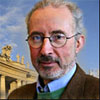 In Jerusalem and Bethlehem. Where the Foundations of the Faith Can Be "Touched" - Sandro Magister provides his own selection of excerpts from the Pope's remarks, commenting:
In Jerusalem and Bethlehem. Where the Foundations of the Faith Can Be "Touched" - Sandro Magister provides his own selection of excerpts from the Pope's remarks, commenting:it would be simplistic and misguided to give a purely political interpretation to the overall message that Benedict XVI wanted to address to the Christians of the Holy Land.
In the pope's judgment, the Church will be influential – on the political terrain as well – if it is able to do something different: if it helps above all to "remove the walls that we build around our hearts, the barriers that we raise against our neighbor."
Benedict XVI's main goal is to convert hearts and minds to God. He has said and written this repeatedly.
And he has remained absolutely faithful to this "priority" even on a trip so loaded with political significance as the one he is making to the Holy Land.
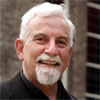 The Pope, Arabic Islam and the West, by Samir Khalil Samir (Asia News May 14, 2009). According to Samir, it is in Jordan that the Pope "laid the basis for collaboration between Muslims and Christians, East and West." While the Arab press focused on past resentments toward the Regensburg address, Fr. Samir encountered an atmosphere that "was serene, welcoming and of shared trust." He offers an analysis of the Pope's remarks at the University of Madaba, for him "the key point of the pilgrimage":
The Pope, Arabic Islam and the West, by Samir Khalil Samir (Asia News May 14, 2009). According to Samir, it is in Jordan that the Pope "laid the basis for collaboration between Muslims and Christians, East and West." While the Arab press focused on past resentments toward the Regensburg address, Fr. Samir encountered an atmosphere that "was serene, welcoming and of shared trust." He offers an analysis of the Pope's remarks at the University of Madaba, for him "the key point of the pilgrimage":It’s very important that in a Muslim (and Christian) world, often theocratic, the pope, before speaking of religion, speaks of culture and science. And the aim of science is to love and discover truth. He insists that this intellectual formation “will sharpen their critical skills, dispel ignorance and prejudice, and assist in breaking the spell cast by ideologies old and new”.
Read the rest of Fr. Samir's analysis.“Critical skills” are important in the Arab world: without criticism faith can become fanaticism, superstition or even manipulation. The pope touched on a point that is vital for the growth of the region: the absence of the critical eye, results in people following one or other political leader, without ever questioning the need for democracy, freedom, human rights, coexistence. People religiously follow, without ever questioning the principals of their own faith; holding onto traditions for fear of drowning in freedom of conscience. This is true of all religions not just Islam. Ignorance or prejudice, for the pope, threatens peace and dialogue.
And when he speaks of the “enchantment of ideologies” he alludes to the easy way people let themselves become consumed by fanaticism and violence.
He says: “Religion, of course, like science and technology, philosophy and all expressions of our search for truth, can be corrupted. Religion is disfigured when pressed into the service of ignorance or prejudice, contempt, violence and abuse”.
Benedict XVI puts all of these realities into the same boat because everything can be disfigured – even science. For him, what is important is that religion is not abused or disfigured.
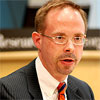 Three great ironies about Benedict's Holy Land visit, by John Allen Jr. (National Catholic Reporter May 15, 2009):
Three great ironies about Benedict's Holy Land visit, by John Allen Jr. (National Catholic Reporter May 15, 2009):After the most demanding high-wire act of his papacy, a grueling week that saw the 82-year-old pontiff deliver 28 speeches while shuttling among Jordan, Israel and the Palestinian Territories, it seems terribly simplistic to offer a report card, but here we go nonetheless: Give Benedict XVI an A for effort, and a B for execution.
John Allen offers comprehensive analysis with some good insights. For example, on the sometimes harsh and abrasive criticism by Israelis of the Pope's words at Yad Vashem:"In effect, they argued, the very fact that Israelis weren't content just to see a pope at Yad Vashem, or at the Western Wall, is itself a sign of progress. It means that a pope coming to Israel is no longer a revolution or a cause célèbre, but rather an expression of a basically normal relationship.
As far as the "three great ironies" of the Pope's trip, Allen notes first that the "wordsmith pope, whose métier is generally ideas rather than images, often seemed to have more success at the level of symbolism"; secondly, that for one "notoriously resistant to attempts to turn the Catholic church into a political action committee, or the message of the Gospels into a revolutionary manifesto," Pope Benedict's "strongest moments came in the political arena"; and finally, that while Pope Benedict "is arguably the pope most inclined to be sympathetic to Israel since the Jewish state was founded six decades ago, yet the Israelis in some ways were his toughest crowd":Historically inclined Israelis see a progression from Paul VI's visit in 1964, when the pontiff refused to utter the words "state of Israel" or to refer to the country's president as anything other than "mister"; to John Paul in 2000, a trip that transformed relations; to Benedict in 2009, a visit reflecting a now-routine friendship, with its ups and downs, but fundamentally there's no turning back.
Benedict XVI thus arrived in Israel not only as a pope committed to theological and spiritual fraternity with Judaism, but also one less instinctively hostile to concrete Israeli policies than many other Catholic leaders.
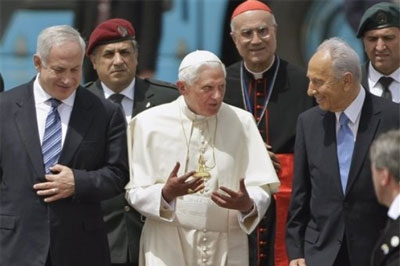
Read the rest.Perhaps the point was invisible to most of the Israeli public, but local Palestinian Christians actually complained before, and during, the trip that the pope was caving in to Israeli sensitivities at every turn -- not travelling to Gaza, not protesting when the Israelis refused to allow the residents at Aida to erect the stage immediately below the wall, and not protesting when the Israelis closed down a Palestinian press center in East Jerusalem. Even his schedule reflected deference to Israeli sensibilities. Benedict made sure to fly out of Tel Aviv well before sundown on Friday, so as not to disrupt the Sabbath.
Most Israeli leaders seemed to recognize this, which is probably why they rushed to Benedict's defense when the criticism began. At the inter-faith event in Nazareth, for example, Bahij Masour, who heads the religious affairs division of Israel's Foreign Ministry, made a point of saying during his introduction that the pope "has clearly condemned anti-Semitism and denial of the Holocaust." Certainly Israel's President, Shimon Peres, went out of his way to be gracious to the pope, including hosting a lavish gala in his honor at the presidential palace in Jerusalem on Tuesday.
As Israelis sort through the images left behind by the pope's trip, perhaps more of this will become clear.
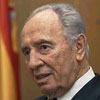 Commenting on the Pope Benedict XVI’s visit to the Holy Land, the president of Israel, Shimon Peres, said on Wednesday: "The entire message of the Pope is positive and could spark important reflection" (Catholic News Agency):
Commenting on the Pope Benedict XVI’s visit to the Holy Land, the president of Israel, Shimon Peres, said on Wednesday: "The entire message of the Pope is positive and could spark important reflection" (Catholic News Agency):In an interview with L’Osservatore Romano, Peres said, in order to "have a clear idea of the message left by Benedict XVI," it is "necessary to combine his discourse at the airport" in which he deplored anti-Semitism and encouraged Christians to promote peace, with "the one at Yad Vashem," in which he reiterated the commitment to the Church to denounce all hatred.
Peres told the Vatican newspaper that there was no one better than the Pope to express rejection for any religion that justifies violence. He said the Holy Father’s strongest message was "perhaps his arrival speech. More than once the Pope has spoken of the role of the three monotheistic religions in the building of a lasting peace."
Referring to the search for peace, Peres noted that a new trend is emerging in the Middle East. People are no longer "satisfied with bilateral agreements, but rather seek regional agreements for peace and peaceful coexistence with the understanding that modern democracy does not consist of the right to be equal, but in the equality of rights to be different; in which all prayers can reach heaven without interference or censure."
- In Holy Land, pilgrim pope delivers religious, political challenges - A decent recap by John Thavis (Catholic News Service):
Pope Benedict XVI's eight-day visit to the Holy Land was a biblical pilgrimage, an interfaith mission and a political balancing act all rolled into one.
It was also a gamble. In a region hardened by decades of conflict and simmering social and religious tensions, there was no guarantee of success.
The long-range verdict is yet to come on this "pilgrimage of peace," but the pope certainly delivered a clear and challenging message to his diverse audiences in Jordan, Israel and the Palestinian territories May 8-15. That alone was an achievement. ...
- "Singing away theological differences in Nazareth" - Tom Heneghan comments on poignant-if-curious moment for the former Prefect of the CDF:
This sing-along started at an interfaith meeting when a rabbi began singing a song with the lyrics “Shalom, Salaam, Lord grant us peace.” At some point, the 11 clerics on the stage stood up and held hands to sing the simple tune together. Never very spontaneous, Benedict looked a little hesitant but then joined in. It was something of a “kumbaya session” — a “religious version of We Are The World,” one colleague quipped — but it was good-natured and well meant. The pope has been preaching interfaith cooperation at every stop on his tour and it seemed appropriate that it culminate in a show of unity among the religions in Galilee.
But wait a minute. This is the same Joseph Ratzinger who, when he was a cardinal heading the Vatican’s Congregation for the Doctrine of the Faith, frowned on Pope John Paul’s pray-in with other religions at Assisi in 1986. He even declined to attend what became one of the landmark events of his predecessor’s papacy. [More]
- Papal Pilgrimage Ends With a Bang: Benedict XVI Sums Up Message in Packed Address, by Father Thomas D. Williams, LC (Zenit News):
Benedict took advantage of his last meeting with Israeli President Shimon Peres to reiterate the key messages of his pilgrimage to the Holy Land. This Pope -- whom many consider incapable of uttering a sound bite -- managed to condense his week’s message into an 859-word address that lasted no more than three minutes. Somehow in this brief interval he was able to encapsulate the gist of the 29 different encounters that he had throughout this action-packed week. It seemed as if he were back in the university classroom once again, summing up his day’s lecture to keep his more distracted students on track. ...
- Pope in Holy Land where fear breeds criticism, by Franco Pisano (AsiaNews):
In Lebanon As Safir, a pro-Syrian newspaper close to the extremists of Hizbollah and Hamas, wrote that the moral authority of the Pope “has no influence on the Arab East that it can leave a trace to shape change.” A Hamas leader accused the Pontiff of not saying things which he had actually said, whilst an imam in Nazareth, who wanted to build a mosque close to the Church of the Nativity, said he “was not welcome.” Israeli closer to the opposition and the ultra-orthodox right attacked him, also forgetting what he said the same day. Part of the Western media echoed such views. If extremists and others, those who are against him on principle, attack him, then Benedict XVI has achieved some results for one does not attack someone who is irrelevant.
- Fr. Raymond J. de Souza: Pope Benedict XVI's visit "a reason to give thanks" (National Post May 16, 2009):
Pope Benedict returned to Rome likely content with the workmanlike success of his trip. A spectacular triumph it wasn't. Yet the principal task was accomplished just by coming, lest it be said that the German pope declined to visit Israel. To get here was a struggle, with the Vatican having to overrule local Catholics who were lukewarm to the visit, and the more determined opposition of other Christian leaders. The Christian Arabs here thought the visit would be an undeserved propaganda triumph for an Israeli government they deeply mistrust. They asked the Pope not to come. He came anyway.
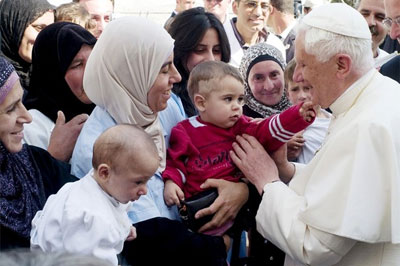
- Commonweal's Paul Moses on Benedict’s effort to reach Arab world:
Benedict made a strong effort to speak to the Arab world on this trip. I haven’t made a line-for-line comparison of their remarks, but my sense is that Benedict was more pointed than John Paul was in his defense of the Palestinian people. ...
This may turn out to be the most significant aspect of the trip - more so than the debate on whether the pope should have spoken more personally about the Holocaust. One must suspect that at least some of the negative reaction in Israel was driven by the pope’s take on the Israeli-Palestinian dispute. Or, as an editorial in the Jerusalem Post put it, “The past week showed that on the Palestinian-Israeli conflict, Pope Benedict XVI just doesn’t get it. ” But maybe he does.
- Photographer Stefano Spaziani has some amazing footage of the Pope's visit to Israel
- Yechiel Eckstein, founder of the International Fellowship of Christians and Jews, believes the Pope's trip to Israel was a success and laments those Jewish critics declining to attend the papal events, and says "there is no question that this pope deeply respects Judaism and stands solidly for the security of the state of Israel" (Wall Street Journal):
As someone who has dedicated the past 35 years to fostering respect between Jews and Christians, I was deeply encouraged by the pope's visit and believe that it has contributed significantly toward supplanting the dark and violent history between Jews and the church.
The world desperately needs this model of reconciliation. I pray that it extends to our Muslim cousins too, so that all the children of Abraham might find peace with one another.
- Benedict XVI's visit to the Holy Land brought with it a "renaissance" in relations between Jews, Muslims and Christians, says Father Caesar Atuire, delegate administrator of Opera Romana Pellegrinaggi, the Vatican institution whose mission is to evangelize through pastoral tourism and the ministry of pilgrimage. (Zenit News)
- Leading rabbis in interfaith relations applauded Pope Benedict XVI’s speech at the Yad Vashem Holocaust memorial in Jerusalem, countering criticism from Israeli politicians and journalists (MetroCatholic):
“I really think it is purposeless to parse every word of the pope, and to read into [his remarks] nuances that were not intended,” said Rabbi Gilbert Rosenthal, Executive Director of the National Council of Synagogues.
Rabbi Rosenthal made his comments at a press conference with Archbishop Timothy Dolan of New York following the spring meeting of the consultation of the U.S. Conference of Catholic Bishops’ (USCCB) with the National Council of Synagogues (NCS) of America, May 12, in Manhattan.
Rosenthal added that “the Holy Father went to Yad Vashem; he prayed at the Wall; he reiterated the fact that the Shoah must never be forgotten and that the names of the six million victims must never be erased from historic memory.”
Rabbi Alvin Berkun, President of the (Conservative) Rabbinical Assembly, stood with Rabbi Rosenthal, and said the pope’s visits to both the memorial and the Western Wall, where he placed a prayer for peace among the religions and states of the region, build on the successes of his predecessor, Pope John Paul II, who visited the Holy Land in 2000.
- "My encounter with the Pope", by Rabbi Benjamin Blech. Aish.com. An eyewitness to the Pope's encounter at Yad Vashem responds to the inquiry, "how does a rabbi feel when he meets the pope?"

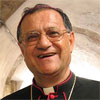 The website of the Franciscan Custody of the Holy Land features an
The website of the Franciscan Custody of the Holy Land features an 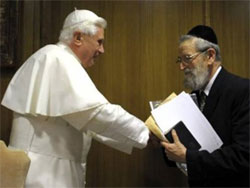 Rabbi Cohen said the Pope went out of his way to make it clear the Vatican would never question Israel’s sovereignty, nor challenge its rights to rule over the Old City of Jerusalem. Between 1949 and 1967, the Old City remained under Jordan’s Islamic rule, and Jews were barred from entering it.
Rabbi Cohen said the Pope went out of his way to make it clear the Vatican would never question Israel’s sovereignty, nor challenge its rights to rule over the Old City of Jerusalem. Between 1949 and 1967, the Old City remained under Jordan’s Islamic rule, and Jews were barred from entering it.
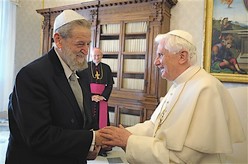 We start things off with some good news:
We start things off with some good news: 
